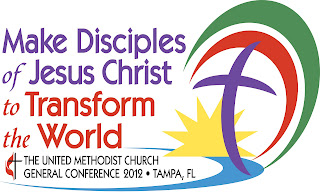General Conference 2012
General Conference, The United Methodist Church’s top legislative body, has begun meeting in Tampa, Florida. Nearly a thousand delegates from around the world set policy and direction for the church, as well as handle other business. General Conference is the only entity that speaks officially for The United Methodist Church.
 As always, there are many issues discussed and voted upon such as sexuality (the subject of homosexuality has been debated at every General Conference since 1972), abortion, church membership, immigration, war and peace, financial reform, and the environment. In the midst of this, the Council of Bishops and the Commission on the General Conference are calling for peace and sharing what God expects of us in our Holy Conferencing (Colossians 3:12-16a, 17). I think three issues this year have the potential truly to change The United Methodist Church.
As always, there are many issues discussed and voted upon such as sexuality (the subject of homosexuality has been debated at every General Conference since 1972), abortion, church membership, immigration, war and peace, financial reform, and the environment. In the midst of this, the Council of Bishops and the Commission on the General Conference are calling for peace and sharing what God expects of us in our Holy Conferencing (Colossians 3:12-16a, 17). I think three issues this year have the potential truly to change The United Methodist Church.
STRUCTURE Much research (the Call to Action) has been done and it says the majority of United Methodist churches are not vital congregations. It advocates many things, including a call to find a more efficient and economical way to run our general church. The official proposal (and there have been counter-proposals too) would consolidate 9 of the denomination's 13 general agencies into a new United Methodist Center for Connectional Mission and Ministry. The plan would replace boards now governed by more than 500 people with a 15-member board of directors, chaired by a layperson. Those 15 board members of the new center, in turn, would be accountable to a proposed 45-member General Council for Strategy and Oversight, chaired by a bishop, and having the authority to hire and fire the center’s future board members.
This legislation includes a proposed amendment to the denomination’s constitution to create a bishop without the usual responsibility of overseeing a geographical area (like the Iowa Annual Conference). That bishop, elected by the Council of Bishops, would chair the 45-member General Council for Strategy and Oversight and serve as the denomination’s chief ecumenical officer, help align the strategic direction of the church, and focus on growing vital congregations.
Essentially, the proposal reduces boards now governed by more than 500 people to a governance of 60. It also allows the board of the newly created center to redistribute up to $60 million toward funding theological education, recruiting young clergy, and fostering vital congregations.
In some ways this is similar to what happened at Salem. Organizationally, we moved from several committees to one Leadership Board. Likewise, the General Conference proposal pushes our denominational agencies to be part of one team, working together towards the same goal. There will certainly be some perfecting as there are valid concerns about appropriate representation, but there are also valid concerns about bloated boards and millions of our mission dollars spent on denominational meetings. Whatever is decided, United Methodists must work together, turning from decline to vitality.
GUARANTEED APPOINTMENTS Another big issue would end job guarantees, a “guaranteed appointment,” for ordained elders in good standing. One study says the practice is not financially sustainable. The legislation would allow bishops and cabinets to give an elder in good standing a less than full-time appointment, and with the approval of their boards of ordained ministry and annual conference’s executive session, to put elders on unpaid transitional leave for up to 24 months. The issue here is how to deal with clergy persons who are not effective.
GLOBAL CHURCH One of the big issues is determining how we will be a global church. Groups of churches in Africa, Asia and Europe are known as “central conferences.” Central conferences will have 372 delegates, up 96 from the 2008 assembly and up 186 from the gathering in 2004. The percentage of international delegates has steadily increased over the years compared to U.S. General Conference delegates. Twelve years ago, General Conference delegates were 16% international. This year they are 38% international. It is estimated that in four years they will be 45% international. It is hoped that General Conference could be held in one of the central conferences by no later than 2024. The bigger question is, how do we make choices and live together as one global church? Much will be decided in the next several days. I invite you to pray for our brothers and sisters gathered in Tampa and for our church.
[note: most of this information was adapted from umc.org]
 As always, there are many issues discussed and voted upon such as sexuality (the subject of homosexuality has been debated at every General Conference since 1972), abortion, church membership, immigration, war and peace, financial reform, and the environment. In the midst of this, the Council of Bishops and the Commission on the General Conference are calling for peace and sharing what God expects of us in our Holy Conferencing (Colossians 3:12-16a, 17). I think three issues this year have the potential truly to change The United Methodist Church.
As always, there are many issues discussed and voted upon such as sexuality (the subject of homosexuality has been debated at every General Conference since 1972), abortion, church membership, immigration, war and peace, financial reform, and the environment. In the midst of this, the Council of Bishops and the Commission on the General Conference are calling for peace and sharing what God expects of us in our Holy Conferencing (Colossians 3:12-16a, 17). I think three issues this year have the potential truly to change The United Methodist Church.STRUCTURE Much research (the Call to Action) has been done and it says the majority of United Methodist churches are not vital congregations. It advocates many things, including a call to find a more efficient and economical way to run our general church. The official proposal (and there have been counter-proposals too) would consolidate 9 of the denomination's 13 general agencies into a new United Methodist Center for Connectional Mission and Ministry. The plan would replace boards now governed by more than 500 people with a 15-member board of directors, chaired by a layperson. Those 15 board members of the new center, in turn, would be accountable to a proposed 45-member General Council for Strategy and Oversight, chaired by a bishop, and having the authority to hire and fire the center’s future board members.
This legislation includes a proposed amendment to the denomination’s constitution to create a bishop without the usual responsibility of overseeing a geographical area (like the Iowa Annual Conference). That bishop, elected by the Council of Bishops, would chair the 45-member General Council for Strategy and Oversight and serve as the denomination’s chief ecumenical officer, help align the strategic direction of the church, and focus on growing vital congregations.
Essentially, the proposal reduces boards now governed by more than 500 people to a governance of 60. It also allows the board of the newly created center to redistribute up to $60 million toward funding theological education, recruiting young clergy, and fostering vital congregations.
In some ways this is similar to what happened at Salem. Organizationally, we moved from several committees to one Leadership Board. Likewise, the General Conference proposal pushes our denominational agencies to be part of one team, working together towards the same goal. There will certainly be some perfecting as there are valid concerns about appropriate representation, but there are also valid concerns about bloated boards and millions of our mission dollars spent on denominational meetings. Whatever is decided, United Methodists must work together, turning from decline to vitality.
GUARANTEED APPOINTMENTS Another big issue would end job guarantees, a “guaranteed appointment,” for ordained elders in good standing. One study says the practice is not financially sustainable. The legislation would allow bishops and cabinets to give an elder in good standing a less than full-time appointment, and with the approval of their boards of ordained ministry and annual conference’s executive session, to put elders on unpaid transitional leave for up to 24 months. The issue here is how to deal with clergy persons who are not effective.
GLOBAL CHURCH One of the big issues is determining how we will be a global church. Groups of churches in Africa, Asia and Europe are known as “central conferences.” Central conferences will have 372 delegates, up 96 from the 2008 assembly and up 186 from the gathering in 2004. The percentage of international delegates has steadily increased over the years compared to U.S. General Conference delegates. Twelve years ago, General Conference delegates were 16% international. This year they are 38% international. It is estimated that in four years they will be 45% international. It is hoped that General Conference could be held in one of the central conferences by no later than 2024. The bigger question is, how do we make choices and live together as one global church? Much will be decided in the next several days. I invite you to pray for our brothers and sisters gathered in Tampa and for our church.
[note: most of this information was adapted from umc.org]



UPDATE: General Conference voted "no" on April 30 to set aside a bishop without the usual responsibility of overseeing a geographical area.
ReplyDelete